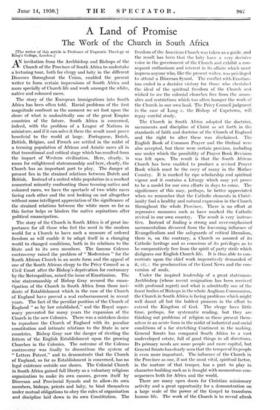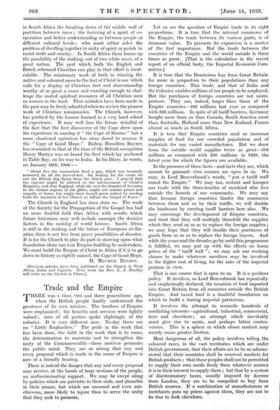A Land of Promise
The Work of the Church in South Africa
[The writer of this article is Professor of Dogmatic Theology at King's College, London.] IT invitation from the Archbishop and Bishops of the Church of the Province of South Africa to undertake a lecturing tour, both for clergy and laity in the different Dioceses throughout the Union, enabled the present writer to form certain impressions of South Africa and more specially of Church life and work amongst the white, native and coloured races.
The story of the European immigrations into South Africa has been often told. Racial problems of the first magnitude confront us the moment we set foot upon the shore of what is undoubtedly one of the great Empire countries of the future. South Africa is concerned, indeed, with the problem of a League of Nations in miniature, and if it can solve it there the result must prove beneficial to the world at large. Portuguese, Dutch, British, Belgian, and French are settled in the midst of a teeming population of African and Asiatic races all in that transitional and critical stage which has resulted from the impact of Western civilization. Here, clearly, is room for enlightened statesmanship and here, clearly, the Church has an important part to play. The danger at present lies in the strained relations between Dutch and British. Instead of a united white population in a 'marked numerical minority confronting those teeming native and coloured races, we have the spectacle of two white races facing each other and the rest looking on not altogether Without some intelligent appreciation of the significance of the strained relations between the white races so far as this factor helps or hinders the native aspirations after political emancipation.
The story of the Church in South Africa is of great im- portance for all those who feel the need in the modem world for a Church to have such a measure of ordered freedom as will enable it to adapt itself in a changing world to changed conditions, both in its relations to the State and to its own members. The famous Colenso controversy raised the problem of " Modernism " for the South African Church in an acute form and the appeal of one of the South African clergy to the Privy Council as a Civil Court after the Bishop's deprivation for contumacy by the Metropolitan, raised the issue of Erastianism. The wise statesmanship of Bishop Gray secured the eman- cipation of the Church in South Africa from those inci- dents of Establishment which in the case of the Church of England have proved a real embarrassment in recent years. The fact of the peculiar position of the Church of England " as by law established," and the Royal supre- macy prevented for many years the expansion of the Church in the new Colonies. There was a mistaken desire to reproduce the Church of England with its peculiar constitution and intimate relations to the State in new countries. Bishop Gray saw the danger of riveting the fetters of the English Establishment upon the growing Churches in the Colonies. The outcome of the Colenso controversy was finally to discontinue the system" of " Letters Patent," and to demonstrate that the Church of England, so far as Establishment is concerned, has no legal existence outside our shores. The Colonial Church in South Africa gained full liberty as a voluntary religious organization to make its own canons, govern itself by Diocesan and Provincial Synods and to allow. its own members, bishops, priests and laity, to bind themselves under mutual obligations to obey the rules of organization and discipline laid down in its own ConStitiition. The freedom of the American Church was taken as a guide, and the result has been that the laity have a very decisive voice in the government of the Church and exhibit a con- sequent enthusiasm and interest in its affairs which must impress anyone who, like the present writer, was privileged to attend a Diocesan Synod. The conflict with Erastian- ism ended in a decisive victory for those who cherished the ideal of the spiritual freedom of the Church and wished to see the colonial churches free from the anom- alies and restrictions which too often hamper the work of the Church in our own land. The Privy Council judgment in the case of Long v. the Bishop of Capetown, will repay careful study.
The Church in South Africa adopted the doctrine, sacraments and discipline of Christ as set forth in the standards of faith and doctrine of the Church of England and the right to alter these was disclaimed. The English Book of Common Prayer and the Ordinal were also accepted, but there were certain provisos, including one under which the possibility of Prayer Book Revision was left open. The result is that the South African Church has been enabled to produce a revised Prayer Book which must be the envy of many in the Mother Country. It is marked by ripe scholarship and spiritual vigour and it contains a Liturgy which may yet prove to be a model for our own efforts in days to come. The significance of this may, perhaps, be better appreciated when we remember that the Catholic elements in Christ- ianity find a healthy and natural expression in the Church throughout the whole Province. There is no effort at repressive measures such as have marked the Catholic revival in our own country. The result is very instruc- tive. Instead of finding a strong and over-emphasised sacramentalism divorced from the leavening influence of Evangelicalism and the safeguards of critical liberalism, there is, on the contrary, a Church so assured of its Catholic heritage and so conscious of its privileges as to be comparatively free from the spirit of party strife which disfigures our English Church life. It is thus able to con- centrate upon the chief work imperatively demanded of it, viz. : the proclamation of the Good News and the con- version of souls.
Under the inspired leadership of a great statesman- Archbishop (whose recent resignation has been received with profound regret) and what is admittedly one of the finest bodies of Bishops in the whole Anglican Communion, the Church in South Africa is facing problems which might well daunt all but the boldest pioneerS in the effort to extend the Kingdom of God. The clergy have little time, perhaps, for systematic reading, but they are thinking Out problems of religion as these present them- selves in an acute form in the midst of industrial and social conditions of a far stretching Continent in the making. General. Smuts has compared South Africa to a vast undeveloped estate, full of good things in all directions. Its primary needs are more people and more capital, but General Smuts has clearly seen that the temper of its people is even more important. The influence of the Church in the Province as one, if not the most vital, spiritual factor, in the nurture of that temper, has a part to play in character-building such as is fraught with momentous con- sequences both for Africa and the world.
There are many open doors for Christian missionary activity and a great opportunity for a demonstration on a large scale of the power of the Gospel to transform human life. The work of the Church is to reveal afresh in South Africa the breaking down of the middle wall of partition between races ; the fostering of a spirit of co- operation and better understanding as between people at different cultural levels ; who must either solve the problem of dwelling together in unity of spirit or perish in racial strife and enmity. In South Africa there looms up the possibility of the making, out of two white races, of a great nation. The part which both the English and Dutch reformed Churches can play in that effort is incal- culable. The missionary work of both in winning the native and coloured races to the feet of Christ is one which calls for a display of Christian tact and statesmanship worthy of so great a cause and exacting enough to chal- lenge the united spiritual resources of all Christian men or women in the land. That mistakes have been made in the past may be freely admitted when we review the pioneer work of Christian missionaries. The Church, however, has profited by the lessons learned in a very hard school of experience. It may well face the future mindful of the fact that the first discoverer of the Cape drew upori his experience in naming it " the Cape of Storms " but a more chastened optimism has since dared to rename it the " Cape of Good Hope." Bishop Hamilton Baynes has reminded us that at the time of the British occupation Henry Martyn was on board the fleet which lay anchored in Table Bay, on his way to India. In his Diary, he wrote, on January 10th, 1806 :- " About five the commodore fired a gun, which was instantly answered by all the men-of-war. On looking for the cause we saw the British flag flying from the Dutch port. I prayed that the capture might be ordered to the advancement of Christ's Kingdom, and that England, while she sent the thunder of her arms to the distant regions of the globe, might not remain proud and ungodly at home, but might show herself great indeed by sending forth the ministers of her Church to diffuse the Gospel of Peace."
The Church in England has since done so. The work of the Society for the Propagation of the Gospel has had no more fruitful field than Africa with results which future historians may well include amongst the decisive factors in the making of world history. South Africa is still in the making and the future of European civiliz- ation there is not free from grave possibilities of disaster. It is for the Church to play its part in showing upon what foundation alone can true Empire-building be undertaken. We must build the Empire of Christ in Africa if it is to go down to history as rightly named, the Cape of Good Hope.
H. MAURICE RELTON.
[Previous articles have been published on the Church in West
Africa, India and Uganda. Next week the Rev. E. J. Bentley will write on the Church in China.]



































 Previous page
Previous page